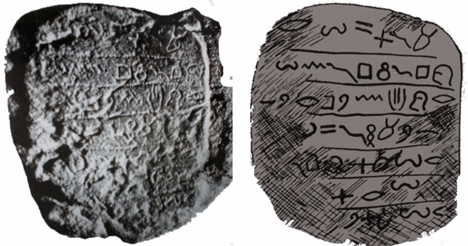Further, why should I accept your statement about ignoring the JW's? They could say that same about your information. Can you show me a 1st to 2nd century Roman era cross that supports your claim?
The Greek word translated "cross" in many Bibles is the Greek word "stauros", which means "an upright pole, especially a pointed one, a cross". The word itself, therefore, can be used for both shaped pieces of wood. However, the details of the narrative give us a clearer picture. If a stake had been used instead of a cross, then Jesus' hands would have been placed over his head and a nail driven through his wrists. Since the wrists would most likely overlap, only one nail would be driven through both wrists. However, John 20:25 says:
"Then the other disciples said to him, We have seen the Lord. But he said to them: Unless I shall see in his hands the print of the nails, and put my finger into the print of the nails, and thrust my hand into his side, I will not believe."
Notice the use of the word nails (plural) in reference to his hands (plural). It makes much more sense to say that Jesus was crucified on the cross with his hands outstretched and a nail in each hand, one on top of the other on a stake. That is why it is said :
". . . in his hands the imprint of the nails . . ."
Therefore, it is most logical to assert that Jesus died on a cross with his arms outstretched. This also accords well with relevant archaeological evidence. The remains of a crucified Jewish man named Yehohanon, found in the late 20s AD. C.E. (not long before Jesus) was executed under the administration of Pontius Pilate, were unearthed in a Jewish tomb. Forensic analysis of the remains indicates that he was crucified with his arms outstretched. A nail was still found embedded in his heel bone. All of these details are consistent with the description of Jesus' similar execution under Pilate and suggest a cross shape rather than a single upright beam or stake.
The testimony of early Christians also unanimously points to a cross shape. A popular Christian writing from the early 100s AD. Chr. compares the cross to the Greek letter "tau," which looks a lot like our "t," and also speaks of the cross depicted in the figure of Moses stretching his arms across the battlefield of the armies of Israel. Justin Martyr (114-165 A.D.), a native of Samaria, located between Galilee and Judea, where most of Jesus' ministry took place, wrote that the Passover lamb anticipated not only Jesus but also the cross because:
"The lamb that is roasted is roasted and disguised in the form of the cross. For a spit is pierced from the lower parts to the head, a spit over the back to which the legs of lamb are attached."
Irenaeus also describes the shape of the cross as pointing both up and down and to each side, and mentions a post on which the nailed person rests. The "Palatine Graphito" (a late second-century Roman graphite mocking a Christian for worshipping the crucified Jesus) also depicts Jesus' execution as taking place on the cross. Even some of the earliest New Testament manuscripts that have been found (P45, P66, and P75) abbreviate the Greek word "stauros" by omitting the "au" in the middle and superimposing the Greek letters for "t" and "r," forming a "t" shape with a circle over it, or a graphic of a crucified figure on the cross. All of these together represent a fairly comprehensive testimony that the earliest Christians believed Jesus died on the cross with his arms outstretched. Not only do they represent an early witness, but they also lived in the world in which Jesus lived and would know better if crucifixions were not carried out in this manner.

